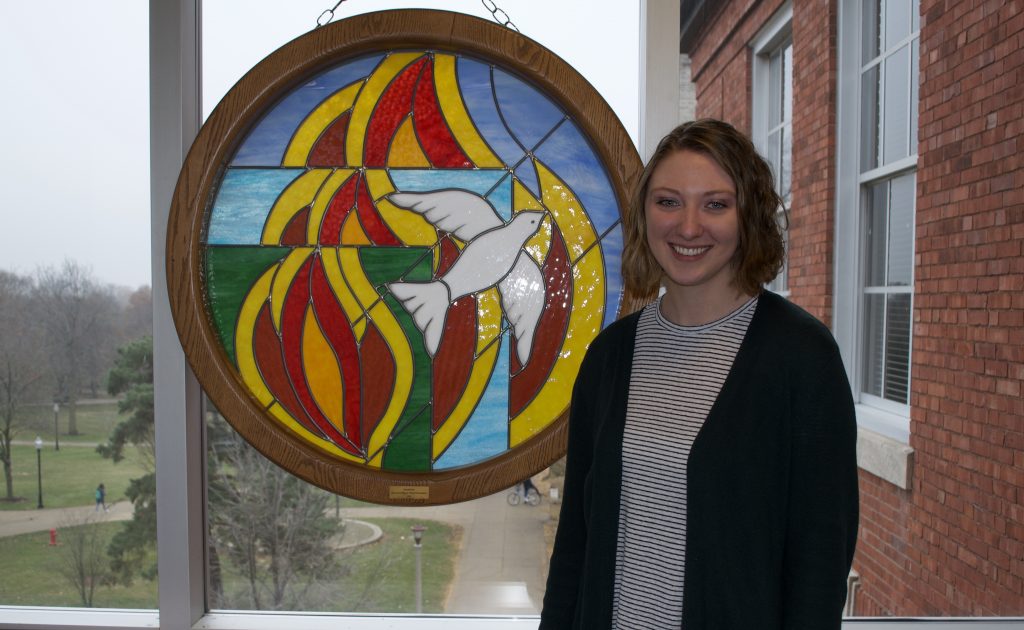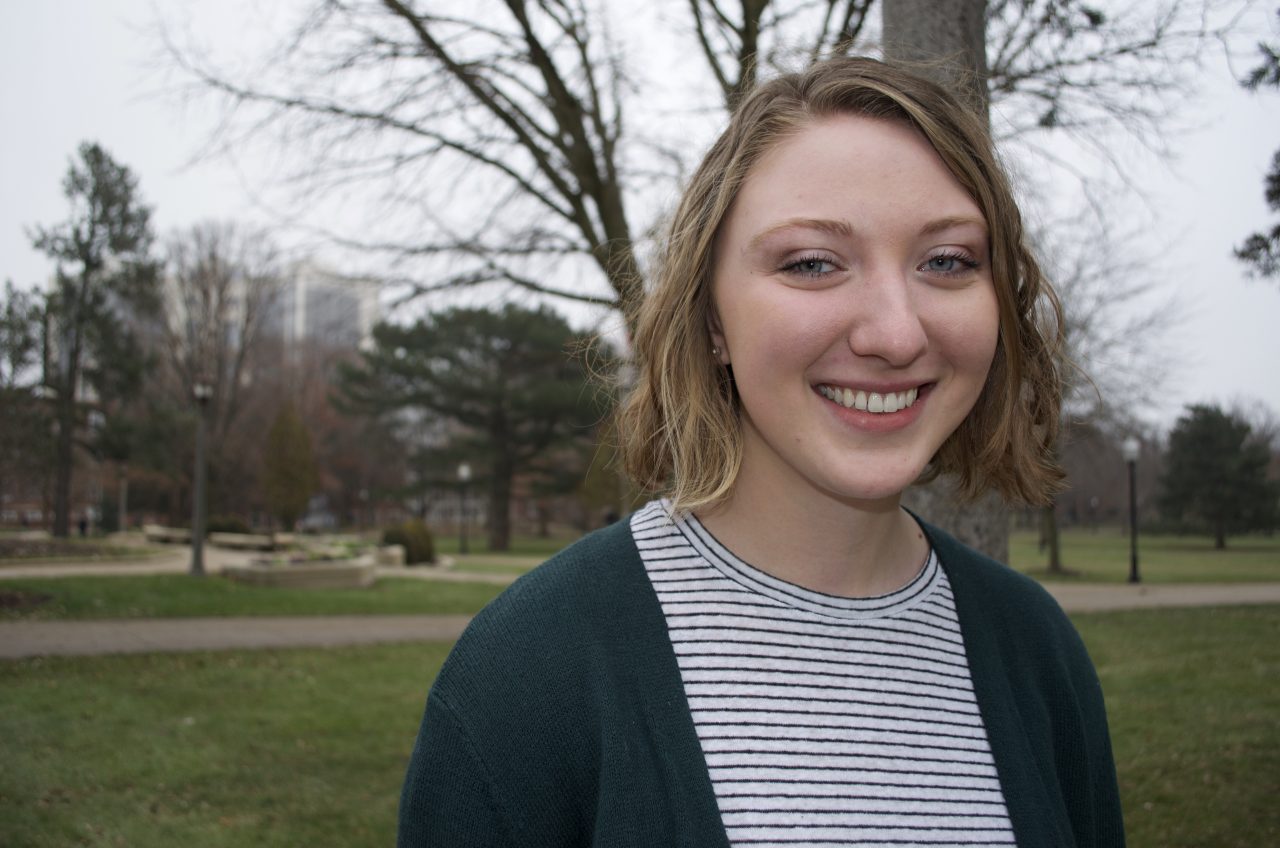Two years ago, if you had told Mennonite College of Nursing (MCN) junior Heather Paterson that she would add a minor to her nursing degree, she wouldn’t have believed you. The schedule of a nursing student is demanding on its own. Now she firmly believes her minor in women’s and gender studies (WGS) is helping her to become a better nurse.
“I did it for fun, really.”
“I fell into the WGS minor almost by accident,” Paterson said.
In her freshman year, she was signed up for Kyle Ciani’s History 112 course by her advisor to meet a general education requirement.
“I hated history classes in high school, but I fell in love with this class. It’s all about families and learning that women worked outside of the home,” Paterson said.
Ciani understood the unique schedule that a nursing student has, and her support encouraged Heather to take additional WGS courses the following semester.
“I did it for fun, really,” she said. “I just wanted to soak up as much as possible from WGS faculty. So I wondered, hypothetically, what would it look like to do the minor?”
Diving into women’s and gender studies
“I never want my patients to be afraid of talking to me. Doing my job correctly depends on my ability to earn their trust.”
A minor in WGS helps prepare nurses to understand their patients better and therefore provide higher quality care. According to the WGS website, “The women’s and gender studies program is an interdisciplinary community of scholars committed to a transformative analysis of gender as it intersects with class/caste, sexuality, race, ethnicity, ability, age, coloniality, and transnationality.”
These lived experiences impact the relationships between health care workers and patients.
“For example, the LGBTQ community has a lot of distrust with healthcare because of ways they have been treated in the past,” Paterson said. “I never want my patients to be afraid of talking to me. Doing my job correctly depends on my ability to earn their trust.”
Paterson has been curious about gender studies since high school, but it was actress and LGBT advocate Laverne Cox’s visit to Illinois State in 2015 that ignited her passion for the field.
“One thing she said that stuck out to me was, ‘Don’t ask me about my genitalia. You don’t need to know.’ It’s like that with nursing, too,” Paterson said. “How do we approach caring for a trans or nonbinary patient? Yes, we need to understand anatomy, but we also need to understand them as a person. Part of that is using their proper pronouns.”
“Words are powerful… and we need to include other identities.”
In her Gender, Sex, and Power course with Tanya Diaz-Kozlowski, Paterson learned that it’s important to know how to use language in an ethical way.
“Words are powerful,” she said. “In nursing, sometimes we interchange gender and sex. We need to use the proper language for these terms, and we need to include other identities.”
Heather has her own ideas about how to improve these language practices in health care settings, too.
“I’d love to see gender pronouns on nurses’ badges. It’s the easiest thing—a few typed letters—and it might help patients feel comfortable having those conversations,” she said.
Dean Judy Neubrander also emphasizes the importance of caring for the patient, not just the ailment.
“At MCN, we truly believe that you need to take a holistic approach to health care. It’s about the patient, not the list of symptoms on the chart,” she said. “We focus hard on making sure that our students think in that way.”
Nursing students with a minor? Making the schedule work
Heather had some flexibility because she planned to study abroad one summer, which freed up some time in the spring and fall for extra classes that would fulfill the WGS requirement.
Some of the requirements for the minor satisfied particular general education requirements, too, such as ENG 128: Gender in the Humanities.
“There are some classes I double- or triple-dipped in to meet the requirements for my minor, my prerequisites, and my general eds. I went through and realized the majority of the general eds I was in already fulfilled the minor.”
While she makes it sound like a breeze, she admits it wasn’t always easy. Her Feminist Philosophy course with Allison Bailey was one of the hardest she has taken at ISU.
“But I learned so much,” she said. “It gave me exposure to big names like Audre Lorde and bell hooks.”
These writers, she says, armed her with the language necessary to understanding how systems of privilege and oppression work as well as how institutions function.
How science and the humanities help us see the patient as a whole person
WGS courses helped Heather understand a variety of systemic issues that impact the lived experiences of patients.
Not limited to conversations about gender and sexuality, WGS courses helped Paterson understand a variety of systemic issues that impact the lived experiences of patients as well as the relationship between patients and health care workers.
“In Adult I, we were talking about risks and survival rates for cancer,” Paterson said. “Dr. Miller said something about how women of color are more likely to die of cancer than white women. My WGS minor gave me a different lens into understanding why that is; I know now that sometimes it’s beyond medical reasons. Sometimes patients don’t have the money for treatment, or they don’t have access to treatment facilities, or they choose not to pursue treatment because of negative experiences they’ve had in the past with health care workers.”
A primary focus of the Mennonite College of Nursing mission is to care for the vulnerable and underserved. By understanding systemic issues, Heather is better able to live that mission, thinking about how she as a nurse can help patients overcome obstacles to their treatment. “Another big thing in nursing is not only helping a person while they are under your care but also figuring out what needs to happen after they get home. How can they take care of themselves so they don’t end up in the same position again? If they need to go to rehab three times a week, do they have the transportation to get to rehab? And if not, how can we help them figure out a solution?”
What Nursing and WGS have in common, then, is an emphasis on empathy and understanding.
What Nursing and WGS have in common, then, is an emphasis on empathy and understanding. “The humanities part of WGS reminds me about how important it is to connect with patients—to be able to look at them and say, I can’t know exactly what you’re going through, but let me listen and try to figure out what we can do to help you,” Heather said. “I think in some ways we tend to get into our own bubble. We forget that people don’t have cars, or they don’t have the capability of taking off work. Sometimes they can’t just leave their child with a babysitter. Both Nursing and WGS taught me to remember that everyone is in a different place and you need to step back and say, OK, what do they need help with? What do they struggle with in their life? How can I make the struggle even a little bit easier?”
The next question is, where will she make it a little bit easier? Currently taking a course on maternal infant nursing, Heather thinks she might be interested in exploring a career in midwifery or labor and delivery. She has time to decide, and she’s letting her curiosity lead the way. Wherever she lands, she’ll have the tools from MCN and WGS with her.
“Nursing is an art. It’s having those personal connections with people.”
“When you think about nursing, you think about science and medicine,” Heather says. “But the more I get into nursing, the more I realize that nursing is an art. It’s having those personal connections with people. No matter where I go, the most important thing is to connect with my patients.”

